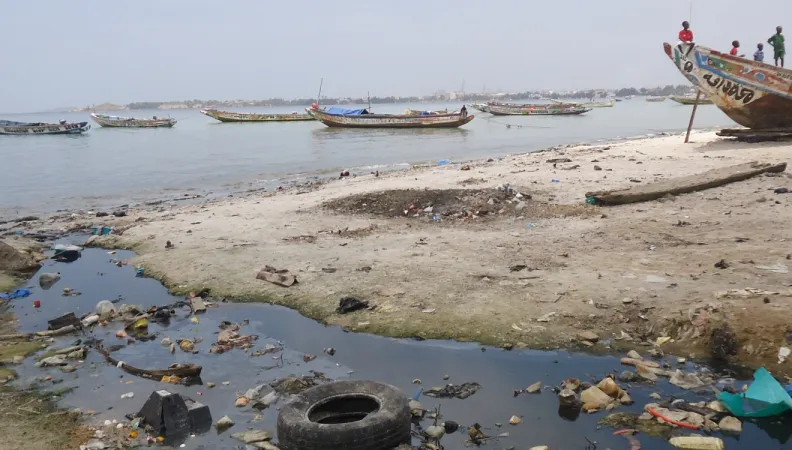Share the page
Hann Bay, Senegal: A Partnership for Depollution and Restoration
Published on

Urban growth and industrialization in Hann Bay in Dakar have led to devastating pollution. For the bustling West African capital, the ramifications of the daily influx of industrial effluents and domestic waste are immense, affecting residents’ health, the fishing and tourism industries, the local environment, and the ocean. With the ninth World Water Forum under way in Dakar, we look at the installation of a new system that will depollute the bay - a project backed by AFD, Invest International, the European Union and CDB.
Surrounded by chemical companies, an abattoir and an oil refinery, Hann Bay in Dakar has endured the years-long discharge of wastewater in what the European Union calls “an ecological disaster,” with colossal health, social, environmental and economic consequences for the country.
“We don’t have fish here anymore,” says Ousseynou Ndiaye, a fisherman based in Dakar. “Ninety-five percent of the factories here in Yarakh (Hann Bay district), discharge their wastewater, and the heat of this wastewater is not good for the sea.” Fishermen have been forced to venture further out to sea, at greater cost, for fewer fish.
A heavy toll on health, the environment and the economy
A drainage canal originally built to channel rainwater into the sea is used as a dumping ground for household waste. Untreated sewerage from households contribute to high levels of contamination – including an elevated concentration of fecal bacteria – has caused health problems: respiratory, dermatological, and gastrointestinal.
See the video: Cleaning up Hann Bay, Dakar
The problem can be traced to rapid urban growth and unchecked development of an area with no proper drainage system. The bay is semi-enclosed, with little circulation, which means the pollutants are trapped in the area, before they are eventually released into the Atlantic Ocean.
Senegal’s infrastructure has not kept pace with development. But a massive multi-partner project is underway to clean up the bay, backed by more than €140 million in financing from the following partners.
Financial contributions making the project a reality:
- State of Senegal (€9.26 M)
- AFD (€83.1 M in grants and loans)
- Netherlands-based Invest International (€30 M in grants)
- The European Union (€14 M in grants)
- Loans from the Chinese Development Bank are also being negotiated
A 15-kilometer depollution solution
Wastewater will be collected and discharged into a treatment network, including a 15 km long conduit that will carry the waste to a treatment plant. The plant will provide the first phase of filtration, which consists of trapping and removing solid matter and sand.
“We can restore the bay’s water quality by eliminating the wastewater discharge coming directly from industrial activity, and indirectly from rainwater canals,” says Alassane Dieng, Project Coordinator at the National Office of Sanitation.
The second phase will consist of bacteriological treatment. The treated water will then be released into the ocean. Construction began in September 2020, is expected to take another one to two years.
Meaningful reforms to prevent future pollution
As part of Senegal’s reforms to the sector, the government will introduce the "polluter-pays" principle via a sanitation charge for companies connected to the network. Manufacturers will be expected to pre-treat their waste, and billing will be based on the quantity of pollutants and the volume of water discharged.
See also: Our special series for the World Water Forum
The Senegal government will also ensure compliance with environmental standards by accelerating the establishment of pre-treatment facilities at the industrial level.
The benefits are expected to be considerable, particularly in the light of reports of people who have suffered skin and respiratory problems due to pollution and faulty sanitation. Tens of thousands of residents across the Hann Bay area stand to benefit from cleaner air, water and sanitation.
“Our children will be in good health, because the living environment will be improved,” says Yandé Ngom, President of Women’s Network of Thiaroye sur Mer. The many Senegalese depending on fish for a living, she hopes, will be able to resume work closer to home. “We won’t have any more problems making a living from (the Bay). We’ll be able to concentrate on ourselves and our activities.”
